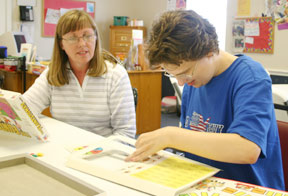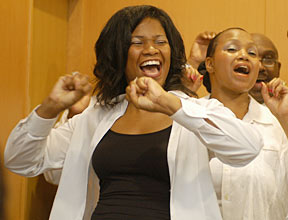Posted: 7/06/07
Texas Baptist Forum
Speaking in tongues
I was concerned with the report that over half of our Southern Baptist Convention pastors believe in a special prayer language (June 11).
| • Jump to online-only letters below |
|
| Letters are welcomed. Send them to marvknox@baptiststandard.com; 250 words maximum. |

“The life of faith is first and foremost about our relationship with God. It is not about how good our behavior is. Nor does it hinge on how correct our theology is. … What God really cares about is whether we love him.”
Njongonkulu Ndungane
Anglican archbishop of South Africa (Communion News Service/RNS)
“Cars shall not be for you an expression of power and domination, and an occasion of sin.”
Driver’s ‘Ten Commandments’
The Vatican’s Pontifical Council for the Pastoral Care of Migrants and Itinerant People, urging safety and charity for motorists (RNS)
“It sounds as if the economic side of the family is serving us divorce papers.”
Tony Perkins
President of Family Research Council, a conservative Christian advocacy group, on the divisions between fiscal and social conservatives on the Republican 2008 presidential field (The Wall Street Journal/RNS) |
If Jesus prayed in a language we could understand, why shouldn’t we? Any language we use should be for the edification of his church, not the division of the saints.
What is most important is that we talk to our Creator; focusing on who he is and who we are. If anyone’s praise and gratitude are voiced in gibberish, I won’t say God can’t understand, but who are you trying to impress? As far as my knowledge goes, the Bible only references the Holy Spirit interceding for us with groans we cannot understand.
As for my heart, it speaks a language I understand and can share with my God and Savior—with which I can also share the good news of the gospel with those around me.
Diana Clendenin
Christoval
At this year’s SBC annual meeting, Southern Seminary President Al Mohler declared that his belief on a certain controversial matter is the only acceptable belief of Baptists.
He stated, in so many words, that all good Baptists believe there is no valid present-day practice of speaking in tongues in private prayer. However, biblically, the human spirit can pray, sing, bless and give thanks to God, using words given by the Holy Spirit, which the mind doesn’t understand (1 Corinthians 14:15-17). The Apostle Paul prayed a lot in this way, privately (1 Corinthians 14:18-19).
More importantly for this discussion, all such spiritual gifts are to be used up to—and in anticipation of—Jesus’ return (1 Corinthians 1:7). Prior to that time, even the best of the gifts can bring only partial satisfaction and understanding (1 Corinthians 13:9-10).
Finally and most importantly, Mohler’s position is in direct disobedience to a command of Scripture (1 Corinthians 14:39b).
Bob Garringer
Austin
Clergy sexual abuse
I am grateful for your courageous and informative articles on the topic of clergy sexual abuse (June 11). Few denominations have addressed this issue unless forced to do so as a result of legal suits or scandal.
I am thankful Texas Baptists are recognizing this problem as one of justice and protection of persons who are vulnerable, and not simply as “risk management.” Your editorial holding congregations responsible for the well-being of their own members and for the members of other congregations that may unknowingly hire an abusive leader was on target.
We must recognize that although clergy sexual abuse may take the form of sexual behavior, the real issue is abuse of a church leader’s spiritual power. Abuse of power is the issue at stake when children are abused; it is also the issue when a leader crosses boundaries with and betrays the trust of adults. When a sexual relationship happens between a church leader and a member of the church community, even when both are adults, it is never an “affair.” It is abuse.
Thank you for providing Texas churches with helpful information about this issue. We must be sure our churches are safe places for all God’s children, even those who are grown up and trust their leaders to seek good for them, and not harm.
Diana Garland
Waco
Execution as godly
I have a different opinion in response to “Execution as torture” (June 25). Crime endangers those who are most vulnerable. Society has an obligation to protect the innocent. That is evident from the biblical precedent for those acts we now classify as offenses that warrant the death penalty.
We are faced with a society under assault from violent criminals. With our prisons overloaded and the recidivism rate at 70 percent, correction and rehabilitation are not working. Crime continues even in prison.
Even maiming, such as cutting off a hand, is not effective and surely not humane. The death penalty, while not perfect, is the only 100 percent effective deterrent to crime.
A major problem is the long appeal process after passing the death sentence. Either a limit of three or at most five years for appeals should follow a death sentence. Whether hanging, electrocution, firing squad, beheading or a lethal drug dosage is the most humane method of execution, only our society by its laws should determine.
Opposition to the death penalty would be an easy way out, but like the ostrich sticking his head in the sand, it does nothing to solve the problem of violent criminals in our society. If the death penalty was abolished forever, it is almost certain society would ultimately find it necessary to condone vigilante justice.
Punishment for violent crime is an unpleasant subject to discuss and surely not politically correct, but face it we must.
Royal E. Smith
Southlake
Clergy Abuse
Commendations and kudos for your approach to the devastating issue of abuse in churches (June 11).
Not only did you provide a balanced context for the problems facing today’s epidemic addiction to pornography and abuse, but you chronicled the convention’s stance and willingness to avoid the structural problems faced by other denominations.
Thank you for breaking the silence and offering helpful guidance for dealing with and avoiding further problems through “redemptive” ministry.
Jerry Tanner
Kingsville
Chaplains
Thanks for your Memorial Day package and all the information about our chaplains serving in areas of combat (May 28). Praise God for all of them.
The article on the New Baptist Covenant meeting was very informative also. I see that more politicians have joined the ranks, and we will surely be guaranteed a political meeting just like the government, where nothing is accomplished. The largest group will be absent. The Southern Baptist Convention will not be attending I understand, so the things that affect Texans most will be ignored.
One good thing is the courageous move by Mike Huckabee in that he has cancelled his participation after President Jimmy Carter lambasted President Bush. I can only hope that some of the others will do the same. Why in the world did they decide to take on this project at this particular time? It seems pretty obvious to me.
Betty Westbrook
Plano
Death Penalty
I would like to comment on the letter about the death penalty (June 25).
First, God gave mankind the death penalty in Genesis 9:6. It was further revealed and codified by God in Exodus 21:12-24. In the New Testament, Paul comments on it in Romans 13:1-4.
While cultural ideas have changed on what is cruel and unusual punishment, God has given us the death penalty, and it is civil government’s duty to see it carried out by whatever means is acceptable in its time.
The writer let his personal cultural ideas cloud his judgment on this issue. The Scripture is plain and clear. Civil government is ordained by God to punish evildoers and it bears not the sword in vain.
Michael Simons
Cleburne
Faith & Politics
I agree with your editorial “We need to discuss faith and politics” (June 25). Why are people afraid to discuss politics among their Christian friends?
In this day of talk radio and TV evangelists who tell folks they have the only “truth,” many are afraid to talk about anything that may be politically incorrect.
I have been pleasantly surprised sometimes to find not everyone lacks the courage to disagree with politically correct positions. However, because of the shrill, angry responses to which they have become accustomed, they would rather remain silent than voice their beliefs.
When we are in conversation, we have an obligation to defend the truth, no matter how uncomfortable it may be for us at the moment. Unfortunately, today many of us prefer a beautiful lie to the ugly truth. It is simply easier to go along with the crowd. We have an obligation to get the truth from the Bible and apply it with Christian love. Even when we disagree, we should do so without creating unnecessary offense.
Carl L. Hess
Ozark, Ala.
Ann Carson’s letter (June 11) was sadly reflective of all too many church members of this country, and all too disturbing. Her claim is that the Baptist Standard should not discuss politics because she believes in a “separation of church and state.”
Like most using that term, she apparantly does not know that it does not mean that you shouldn’t speak of politics in church or vice versa, but rather that the state does not control the church, nor does the church directly control the state. That said, the “separation of church and state” as she is using it is unbiblical.
There are numerous places in the Bible, both Old and New Testaments, that clearly state that our faith should—no, must—impact every aspect of our lives. She suggests that using politics to decide to become Christian is equivalent to using Christianity to determine politics. Absolutely incorrect, and absolutely dangerous.
Unlike politics, which are administered by man and controlled by man, Christianity is administered by the Holy Spirit and controlled by God. Obviously, we should not let politics control our Christianity. But it should be just as obvious that Christianity, if authentic, can and must control our politics. If you are voting for politicians that are diametrically opposed to Christian values and doctrines, then it’s time to check your spirit. The last I checked, if you support ungodly activity, you cannot be living a Christian life.
John Swann
Groesbeck
Relevant Issues
What’s going on? When I was a kid, my best friend and I used to read the Baptist Standard and laugh at the issues of the day, such as whether it was worse to have a rattlesnake or a beer in your refrigerator. (At my house, the rattlesnake was more welcome.)
Something has happened. Now, when I pick up the Baptist Standard, I see Baptists addressing poverty, broken homes, starvation in Africa, training church leaders in China, helping families with economic and debt issues, and more.
Texas Baptists better watch out: If we’re not careful, the world will think Texas Baptists have figured out what it means to follow Jesus in the 21st century.
Vic Henry
Sachse
Herbert Reynolds
I did not know Herbert Reynolds at Baylor University, but I did meet and know him when he was director of the research center at Holloman Air Force Base/White Sands Missile Range near Alamogordo, N.M.
As associate pastor at First Baptist Church of Alamogordo, I talked with him when he visited our services and encouraged him in his efforts to teach a men’s Sunday school class at the chapel on the base. He did, and it was the largest men’s Bible class in New Mexico the whole time he taught it. We certainly would have welcomed and used him, his family, his talents and his tithes at First Baptist, but we gloried in the ministry he had with those airmen that we could never hope to match.
I was always very grateful that he led the movement to protect Baylor from a fundamentalist takeover as was openly announced by the same leaders who took over our seminaries. They really wanted to control the largest Baptist university in the world!
Texas Baptists and Christians across the world honor him as a great leader noted for his courage and giant intellect.
Cyrus B. Fletcher
Baytown
There were so many absolutely deserved kudos for my friend Herbert Reynolds (June 11), but I would like to speak from the Air Force active duty experience. Herb and I were stationed together at Holloman Air Force Base, a research and development base. He was not only a “Christian Gentleman” but a true “Officer and a Gentleman.” As we worked together in the chapel program, we could always depend on a crowd when Herb was the speaker.
He shared with many what he called the “witness of excellence,” and he would add: “I run the best lab in the Air Force, and I am a Christian.”
James L. Hays
Norman, Okla.
Christian homemaking seminary course
Just when we think there is nothing left in the fundamental fountain of flawed finesse, we read that at least two of the seminaries are going to offer academic programs for young women that are designed to teach them how to make a Christian home. Making no effort to disguise the intent of this subterfuge, Paige Patterson evidently hopes this ploy will help women further understand that there will never be a place for them in ministerial service
These classes are not for men. The assumption that men are not involved in homemaking, Christian or otherwise, is affirmed by the 1998 doctrinal statement that asserts the Southern Baptist Convention’s belief that a wife has “the God-given responsibility to help her husband and to serve as his helper in managing the household.” That’s it?
We know the present leaders of convention politics see women as “enablers,” not leaders, and they attempt to have us believe God is the originator of that dictum. With that in mind, and flying under the banner of “saving the family” women are, once again, being diminished by men who are, no doubt, Christian, but sadly misguided and biased with a masculine affinity for preferential status in the eyes of God.
A woman who feels God values her as a created being and allows her to respond to a special calling for any service, in his name, cannot function as a Southern Baptist and should remove herself from membership.
Edward Clark
Danville, Ky.
Prayer language
“Half of SBC pastors believe in ‘prayer languages’” (June 11) is the most ridiculous headline I have ever read in the Baptist Standard.
I am 78 years old and have been in a Southern Baptist church since the Cradle Roll department. I have been in a Southern Baptist Sunday school and training union for a lifetime and never heard of “a private prayer language” even in one lesson.
I was saved at the age of 12 and called to preach in a Southern Baptist church at the age of 18. I am now in my 61st year as a gospel preacher.
Preaching as a pastor and as an evangelist in 36 states across our convention, I have never heard a Southern Baptist pastor mention a private prayer language.
Neither have I ever met a Southern Baptist church member who claimed to talk in tongues while praying in public or in private.
I have heard great Southern Baptist preaching throughout my lifetime, and not one preacher ever referred to praying in tongues. I have read thousands of Baptist sermons and never found one mention of private prayer language.
It has been my experience that when a Baptist pastor or church embraces the speaking in tongues heresy, the local Baptist qssociation withdraws fellowship from them.
Half of SBC pastors believe in prayer language?
O, no! That is far, far from the truth.
C.T. McGuire
Timpson
News of religion, faith, missions, Bible study and Christian ministry among Baptist churches, in Texas, the BGCT, the nation and around the world.





